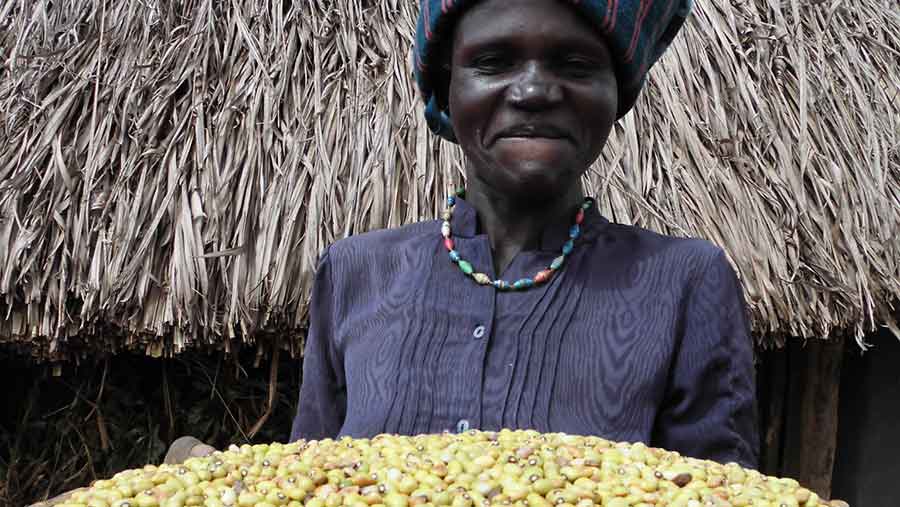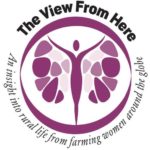Ugandan farming life – all work but ‘pure and clean’ food
‘The View From Here’ is the Farmers Weekly series giving an insight into rural life from women around the world.
Here, Lucy Ajok gives us a glimpse of her life in the countryside in Uganda.

Lucy Ajok
What sort of farm do you live on?
I’m 34 years old and a mother of two boys and three girls. I live on a three-acre piece of land practising mixed farming. I grow green vegetables, beans, peas, groundnuts, sesame.
I also keep two indigenous cows; I have five goats and 10 chickens. I have fruit trees like pawpaws, banana plantain and jackfruits. I have two huts; one for the boys and another for girls and myself and a well-furnished kitchen; I have a clay cupboard and Lorena cook-stove.
How involved are you with the farm?
Very much. I wake up at 6am, check on the children, wake them up to help me around the home before they go to school.
At 6.30am, I help my eldest son to milk the cows. The other children sweep the compound and/or fetch water before they set off for school at 7am after they have had milk tea for breakfast.
I go to the garden either to weed or open up the land as my son takes the cows to graze.
By noon, I am back from the garden to prepare lunch for the returning children at 1pm. Sometimes, if I have no group activities like meetings or joint weaving, I get back to the garden until 5 or 6pm.
 What’s farming/countryside typically like in your area?
What’s farming/countryside typically like in your area?
We use hand hoes/mattock. We do not have tractors or machines. We do everything by our hands.
We grow most of the things we eat at home. We do not have electricity, so there is limited work at night.
Everything must be done before sunset. My best days are market days, which is once a week. The bigger markets are in Gulu town but that is about 30km away.
We do not have nearby schools and clinics. It takes children about an hour to walk to school. Our land is beautiful without steep hills and valleys, though sometimes it can be water-stressed.
How poor or prosperous are farming families in your country
The poorest people in Uganda are from farming families dependent on family labour.
Everything is expensive, especially inputs and yet, when we harvest, the prices are so low.
In fact, if someone was asked to point to a poor person, they’d point at a farmer. Farmers typically have an outlook of poverty.
They are the ones who cannot afford school fees, essential medicines when they fall sick and have no time to relax. They have no free time. Always hustling and struggling.
The weather is changing too much. It is no longer predictable to plant at the right time, which affects our harvests Lucy Ajok
What is the best thing living on a farm?
You eat everything you want without spending money and everything is pure and clean.
It is also nice seeing cows in the morning and seeing your other livestock growing. It is refreshing eating the things that you grew yourself.
What is the worst thing living on a farm?
You are always working. No rest. But also, it is a dirty job and you cannot be as clean as other people all the time. You have to love it to do it. Not everyone loves farming. Farmers are also despised.
What’s the single biggest challenge farmers face where you are?
Farmers are paid very little for their produce, yet they put in a lot of energy. But also the weather is changing too much. It is no longer predictable to plant at the right time, which affects our harvests.
What makes you laugh?
So many things. Sometimes my children tell me stories about school and that makes me laugh.
We have a goat that always comes around when we are having lunch and it likes stealing food from the platter.
It always appears when we are serving and stands by. And sometimes, it comes to me and looks me in the eye as if asking for food too and that makes all of us laugh.
I am a happy person. I am happy with what I have achieved. My daughter is now studying in Gulu town. This year she will sit for her O-level exams. I will be happier when she passes and becomes a nurse.
What makes you angry?
When I go to hospital and I am told the medicine is not available and that I have to buy it in a pharmacy. Yet, sometimes, I have rode my bicycle for 30km to Gulu town.
Is there equality between sexes in your country?
No. Traditionally men sit on chairs or stools and women sit on mats. Also men eat first before women. But also women do a lot of gardening and the men just want to sell.
But Send a Cow is teaching us that all are equal and I try to teach it to my children.
Is farming well supported by government?
No. There are no government agricultural extension officers, but there are many tax collectors in our food markets.
Tell us something about yourself that many people do not know
Not many people outside my group know that I am HIV positive. I do not look sick and I rarely fall sick. Also, not many people know I got married at 14 years and got my son when I was 15 years.
See also: New Zealand farming – living the dream despite the weather

